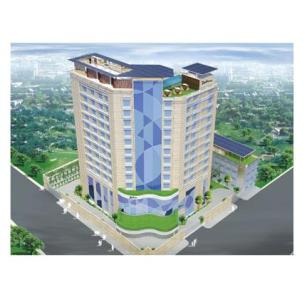Global green building materials market is expected to be $171,475 million in 2015, growing at a CAGR of 11.9 percent from 2016 to 2022 to reach $377,029 million by 2022, says a new research by Allied Market Research.
The exterior products segment dominated the market in 2015 with one-third share, in terms of revenue.
Emission reduction potential of green building materials, high asset value of green buildings, growth in public awareness regarding green materials, and increase in client and market demand are the major factors that drive the green building materials market across the globe, the report said.
In addition, reduction in operating costs and enhanced worker productivity due to healthier indoor environment supplements the market growth.
A wide variety of green building materials are available in the market including linoleum, galvalume panels, and fiber-cement composites. New low-rise and high residential buildings, retrofits of existing buildings, and new industrial buildings are the major areas where growth of green building materials is expected.
DGNB, LEED, BREEAM, HQE, and EnergyStar are some of the certification systems that evaluate performance of the green buildings. They rate the buildings according to some set standards.
According to Eswara Prasad, Team Lead, Chemicals & Materials at Allied Market Research, “Though, cost concerns, market barriers and lack of government policies encouraging green construction are some factors, which hinder the growth of green building materials, continuous innovation and rise in growth of building and construction sector provides a great potential for market expansion.”
Exterior products accounted for more than one-third of the market in terms of revenue in 2015. Employment of green building exterior products in construction industry offers energy efficiency, durability, low maintenance, and operation cost and waste reduction over traditional construction techniques.
Residential buildings segment holds the largest share by application in terms of revenue and is expected to grow at a CAGR of 11.2 percent. Increase in concerns regarding rise in energy prices, accelerating climate change, negative health impact associated with building materials, and stormwater runoff polluting rivers and lakes have reinforced the need for green building construction in the residential sector.
Key findings of the study
- Asia-Pacific is expected to continue to lead the market during the forecast period followed by Europe.
- Solar products market revenue is projected to grow with a high CAGR of 13.5 percent during the forecast period.
- Roofing is the fastest growing segment in green building exterior products registering a CAGR of 12.2 percent during the forecast period.
- Brazil accounts for three-fifths share in LAMEA green building materials market in 2015.
- India grows at a faster rate in Asia-Pacific green building materials market, registering a CAGR of 12.7 percent from 2016 to 2022.
- France accounts for 11.1 percent share in Europe green building materials market in 2015.
- Asia-Pacific and Europe collectively contributed more than half of the share to the global green building materials market revenue in 2015. In the same year, Asia-Pacific dominated the market, owing to the presence of healthier neighborhoods and pressure of environmental regulations pertaining harmful emissions.
The prominent market players are Alumasc Group (UK), Amvik Systems (Canada), BASF (Germany), Bauder (UK), Binderholz (Germany), E. I. du Pont de Nemours and Company (U.S.), Forbo International (Switzerland), Interface (U.S.), Kingspan Group (Ireland), and Owens Corning (U.S.).
editor@greentechlead.com

